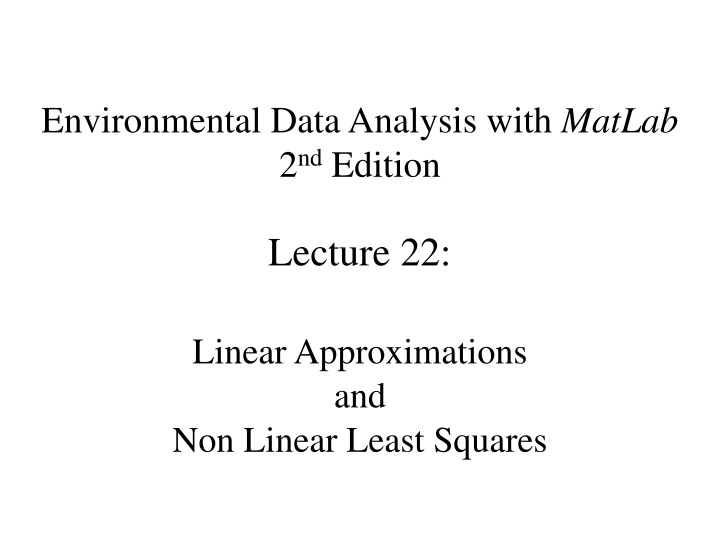
Environmental Data Analysis: Linear Approximations and Nonlinear Least Squares
Explore the application of linear approximations to error estimation and least squares in environmental data analysis. Learn how to make linear approximations of nonlinear functions and apply them effectively. Dive into polynomial approximations and Taylor series to enhance your understanding of data analysis.
Download Presentation

Please find below an Image/Link to download the presentation.
The content on the website is provided AS IS for your information and personal use only. It may not be sold, licensed, or shared on other websites without obtaining consent from the author. If you encounter any issues during the download, it is possible that the publisher has removed the file from their server.
You are allowed to download the files provided on this website for personal or commercial use, subject to the condition that they are used lawfully. All files are the property of their respective owners.
The content on the website is provided AS IS for your information and personal use only. It may not be sold, licensed, or shared on other websites without obtaining consent from the author.
E N D
Presentation Transcript
Environmental Data Analysis with MatLab 2ndEdition Lecture 22: Linear Approximations and Non Linear Least Squares
SYLLABUS Lecture 01 Lecture 02 Lecture 03 Lecture 04 Lecture 05 Lecture 06 Lecture 07 Lecture 08 Lecture 09 Lecture 10 Lecture 11 Lecture 12 Lecture 13 Lecture 14 Lecture 15 Lecture 16 Lecture 17 Lecture 18 Lecture 19 Lecture 20 Lecture 21 Lecture 22 Lecture 23 Lecture 22 Lecture 23 Lecture 24 Using MatLab Looking At Data Probability and Measurement Error Multivariate Distributions Linear Models The Principle of Least Squares Prior Information Solving Generalized Least Squares Problems Fourier Series Complex Fourier Series Lessons Learned from the Fourier Transform Power Spectra Filter Theory Applications of Filters Factor Analysis Orthogonal functions Covariance and Autocorrelation Cross-correlation Smoothing, Correlation and Spectra Coherence; Tapering and Spectral Analysis Interpolation Linear Approximations and Non Linear Least Squares Adaptable Approximations with Neural Networks Hypothesis testing Hypothesis Testing continued; F-Tests Confidence Limits of Spectra, Bootstraps
Goals of the lecture learn how to make linear approximations of non-linear functions apply liner approximations to error estimation apply liner approximations to least squares
polynomial approximation to a function y(t) in the neighborhood of a point t0
polynomial approximation to a function y(t) in the neighborhood of a point t0 find coefficients by taking derivatives
polynomial approximation to a function y(t) in the neighborhood of a point t0 evaluate at t0 0 find coefficients by taking deriatives 0 0
polynomial approximation to a function y(t) in the neighborhood of a point t0
polynomial approximation to a function y(t) in the neighborhood of a point t0 Taylor series
Taylor Series Linear approximation
example Linear approximation
example: distances on a sphere ( 1,L1) ( 2,L2) r measured in terms of central angle, r
exact formula: 6 trig functions approximate formula: 1 trig function and 1 square root
(2,L2=0) ( 1=0,L1=0)
spectral analysis scenario measure angular frequency, m want confidence bounds on corresponding period, T
exact (but difficult) method assume m is Normally-distributed, p(m) work out the distribution p(T) compute its mean and variance by integration
approximate (and easy) method assume m is Normally-distributed with mean mest work out a linear approximation of T in neighborhood of mest use formula for error propagation for a linear functions
consider small fluctuations about the estimated angular frequency Test so
Goal Solve non-linear problems of the form by generalized least squares
Taylor expansion of predicted data with and
Taylor expansion of predicted data linearized equation with and
Taylor expansion of total error gradient vector curvature matrix
linearized least squares minimize error
linearized least squares minimize error
linearized least squares minimize error linear theory
linearized least squares minimize error linear theory
linearized least squares minimize error linear theory
linearized least squares minimize error linear theory
linearized least squares guess for the solution
linearized least squares trial solution deviation of data from prediction of trial solution
linearized least squares trial solution deviation of data from prediction of trial solution linearized data kernel
linearized least squares trial solution deviation of data from prediction of trial solution linearized data kernel correction to solution
linearized least squares trial solution deviation of data from prediction of trial solution linearized data kernel correction to solution updated solution
linearized least squares repeat
prior information written in terms of the unknown =
example of generalized least squares sinusoid of unknown amplitude & frequency superimposed on a constant background level
example of generalized least squares sinusoid of unknown amplitude & frequency superimposed on a constant background level normalized unknowns, so mi 1 level background frequency amplitude
